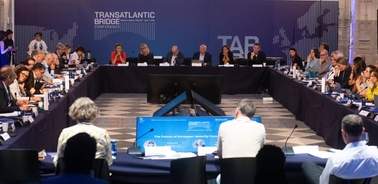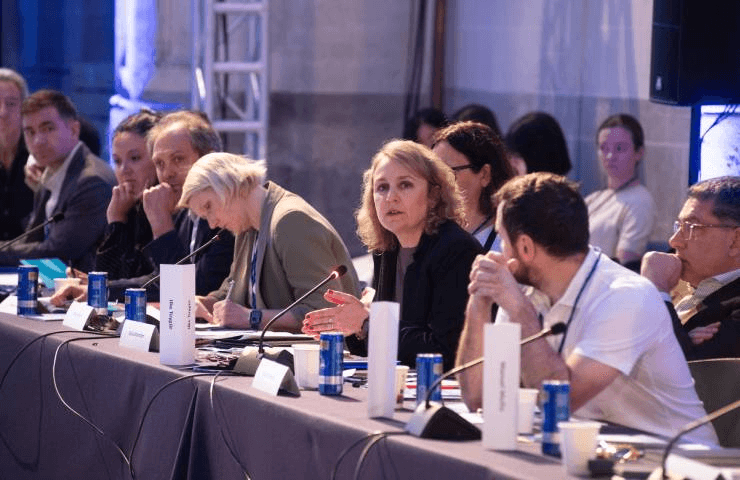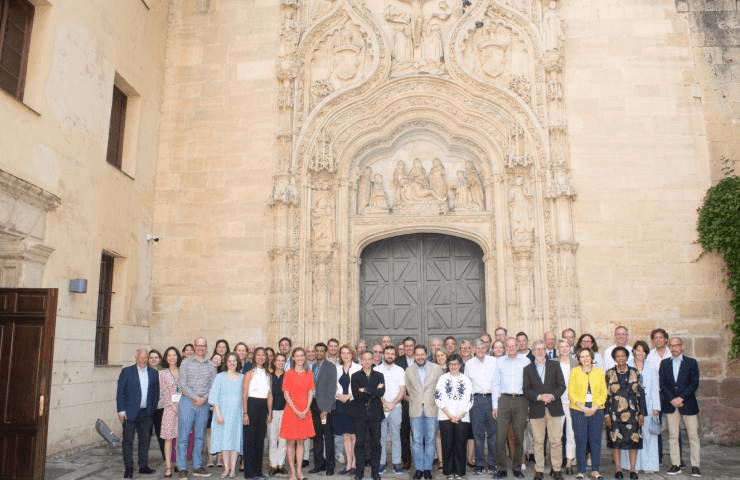The Transatlantic Bridge Conference 2025: Rethinking the EU–US Alliance in a Multipolar World

From May 30 to June 1, 2025, IE University’s Global Policy Center hosted the fourth edition of the Transatlantic Bridge Conference, titled “The Transatlantic Alliance Under Pressure: Existential Threats from Within and Outside.” The event was co-organized with the IE School of Politics, Economics and Global Affairs, the Johns Hopkins School of Advanced International Studies (SAIS), Sciences Po Paris School of International Affairs, and the Yale Jackson School of Global Affairs, and held across IE University’s Madrid and Segovia campuses.
At a moment of unprecedented strain in transatlantic relations, this year’s conference brought together leading scholars, policymakers, and institutional leaders from both sides of the Atlantic to examine the mounting challenges facing the EU–US alliance—and to identify actionable strategies for renewal and adaptation in a rapidly shifting global context.
The conference opened at IE Tower in Madrid with a public panel titled “Trump 2.0: Challenges and Opportunities for Europe.” The discussion featured prominent figures in security, diplomacy, and global trade, including Francis J. Gavin, Giovanni Agnelli Distinguished Professor and Director of the Henry A. Kissinger Center for Global Affairs at Johns Hopkins SAIS; Arancha González, Dean of the Paris School of International Affairs at Sciences Po and former Foreign Minister of Spain; Cecilia Malmström, Senior Fellow at the Peterson Institute for International Economics and Visiting Professor at the University of Gothenburg; and Amanda Sloat, Professor of Practice at IE University’s School of Politics, Economics and Global Affairs and former Senior Director for Europe at the US National Security Council. The session was moderated by David Leonhardt, Editorial Director at The New York Times.
Over the following two days, the conference explored the future of transatlantic relations across a series of in-depth discussions. The first focused on European security and the increasing urgency for Europe to assume greater responsibility for its own defense, particularly in light of uncertainty over the duration of US support for Ukraine. Participants debated the role of ideological divergence in transatlantic relations, the possibility of new coalitions of the willing, and the political will within the EU to pursue a common defense agenda.
Another session examined transatlantic trade and economic sovereignty, assessing the impact of US tariffs, the fragility of global supply chains, and the need for a more secure and sustainable trade approach amid rising tensions with China. A further panel turned to the state of democracy, raising concerns about democratic backsliding, polarization, and the growing influence of illiberal ideologies. Speakers discussed the need to reinforce interdependence, expand partnerships with the ‘Global Majority’, and strengthen institutions in the face of disruptive narratives. The fourth major discussion centered on technology governance, highlighting Europe's dependence on US tech infrastructure and the need for more balanced and independent digital ecosystems.
During the final day of the conference, conversations addressed the response of the ‘Global Majority’ to shifting geopolitical and economic orders, the future of climate diplomacy following the Baku summit, and the limitations of traditional transatlantic frameworks in a world increasingly defined by regional fragmentation and global realignment.
Throughout the three days, the Transatlantic Bridge Conference 2025 reaffirmed the importance of open, critical dialogue in confronting today’s most urgent strategic challenges. As the EU seeks to define its place not only in relation to the United States but also within the broader international system, the conference emphasized the crucial role of academic institutions in shaping informed, forward-looking conversations on the future of global cooperation.

